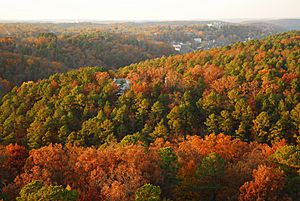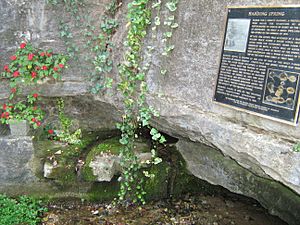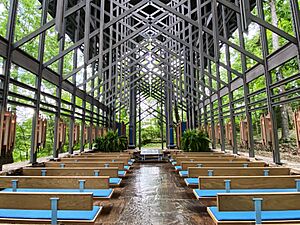Eureka Springs, Arkansas facts for kids
Quick facts for kids
Eureka Springs, Arkansas
|
|
|---|---|
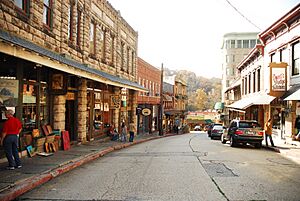
Spring Street
|
|
| Nicknames:
"Eureka", "Little Switzerland of America", "The Stairstep Town"
|
|
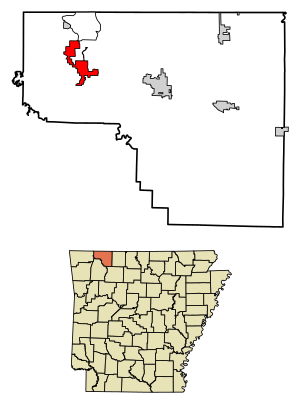
Location within Carroll County and Arkansas
|
|
| Country | United States |
| State | Arkansas |
| County | Carroll |
| Incorporated | 1880 |
| Government | |
| • Type | Mayor–council government |
| Area | |
| • Total | 6.90 sq mi (17.86 km2) |
| • Land | 6.76 sq mi (17.50 km2) |
| • Water | 0.14 sq mi (0.36 km2) |
| Elevation | 1,421 ft (433 m) |
| Population
(2020)
|
|
| • Total | 2,166 |
| • Density | 320.51/sq mi (123.75/km2) |
| Time zone | UTC−6 (CST) |
| • Summer (DST) | UTC−5 (CDT) |
| ZIP Codes |
72631–72632
|
| Area code | 479 |
| FIPS code | 05-22240 |
| GNIS ID | 2403579 |
Eureka Springs is a city in Carroll County, Arkansas, United States, and one of two county seats for the county. It is located in the Ozark Mountains of northwest Arkansas, near the border with Missouri. As of the 2020 census, the city population was 2,166.
In 1970 the entire city, as of its borders at that time, was listed on the National Register of Historic Places as the Eureka Springs Historic District. Eureka Springs has been selected as one of America's Distinctive Destinations by the National Trust for Historic Preservation. Eureka Springs was originally called "The Magic City", "Little Switzerland of the Ozarks", and later the "Stairstep Town" because of its mountainous terrain and the winding, up-and-down paths of its streets and walkways.
It is a tourist destination for its unique character as a Victorian resort, which first attracted visitors to use its then believed healing springs. The city has steep winding streets filled with Victorian-style cottages and manors. The historic commercial downtown of the city has an extensive streetscape of well-preserved Victorian buildings. The buildings are primarily constructed of local stone, built along limestone streets that curve around the hills, and rise and fall with the topography in a five-mile long loop. Some buildings have street-level entrances on more than one floor and other such oddities: the Basin Park Hotel has its front entrances on the floor below first, and a ground-level emergency exit in the back of the building on the fifth floor. The streets wind around the town, with few intersecting at right angles. There are no traffic lights.
Contents
History
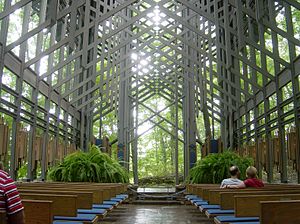
19th century
Native American legends tell of a Great Healing Spring in the Eureka Springs area. People of various indigenous cultures long visited the springs for this sacred purpose.
The European Americans also believed that the springs had healing powers. After the Europeans arrived, they described the waters of the springs as having magical powers. Dr. Alvah Jackson was credited in American history with locating the spring, and in 1856 claimed that the waters of Basin Spring had cured his eye ailments. Dr. Jackson established a hospital in a local cave during the Civil War and used the waters from Basin Spring to treat his patients. After the war, Jackson marketed the spring waters as "Dr. Jackson's Eye Water".
In 1879 Judge J.B. Saunders, a friend of Jackson, claimed that his crippling disease was cured by the spring waters. Saunders started promoting Eureka Springs to friends and family members across the state and created a boomtown. Within a period of little more than one year, the city expanded from a rural spa village to a major city. Within a short time in the late nineteenth century, Eureka Springs developed as a flourishing city, spa, and tourist destination.
On February 14, 1880, Eureka Springs was incorporated as a city. Thousands of visitors came to the springs based on Saunders' promotion and covered the area with tents and shanties. In 1881, Eureka Springs enjoyed the status of Arkansas's fourth largest city, and by 1889 it had become the second largest city, behind Little Rock.
After his term as a Reconstruction governor, Powell Clayton moved to the heavily Unionist Eureka Springs and began promoting the city and its commercial interests. Clayton promoted the town as a retirement community for the wealthy. Eureka Springs soon became known for gracious living and a wealthy lifestyle.
In 1882, the Eureka Improvement Company was formed to attract a railroad to the city. With the completion of the railroad, Eureka Springs established itself as a vacation resort. In only two years, thousands of homes and commercial enterprises were constructed. The Crescent Hotel was built in 1886 and the Basin Park Hotel in 1905. These many Victorian buildings have been well preserved, forming a coherent street scape that has been recognized for its quality. In 1892, the New Orleans Hotel and Spa was built along Spring Street and is now operating as an all-suite hotel full of Victorian furniture and art.
20th century
The Ozarka Water Company was later formed in Eureka Springs in 1905. Carrie Nation moved here towards the end of her life, founding Hatchet Hall on Steele Street. The building was later operated as a museum, but is now closed.
The only bank robbery to occur in Eureka Springs was on September 27, 1922, when five outlaws from Oklahoma tried to rob the First National Bank. Three of the men were killed and the other two wounded.
In 1950 Opera in the Ozarks at Inspiration Point was founded. The organization continues to present an annual summer opera festival in Eureka Springs. In 1967, the famous 7-story Christ of the Ozarks Statue was built. A year later, The Great Passion Play was begun as an outdoor performance piece. It is regularly performed from May through October by a cast of 170 actors and dozens of live animals. It has been seen by an estimated 7.7 million people, which makes it the largest-attended outdoor drama in the United States, according to the Institute of Outdoor Theatre of the University of East Carolina at Greenville, North Carolina. Christian-themed attractions have been added in association with the drama production. These include a New Holy Land Tour, featuring a full-scale re-creation of the Tabernacle in the Wilderness; a section of the Berlin Wall; and a Bible Museum featuring more than 6,000 Bibles. (Items include an original 1611 King James Bible, a leaf from a Gutenberg Bible, and the only Bible signed by all of the original founders of the Gideons.)
In 1980, the architect E. Fay Jones designed Thorncrown Chapel. In 2006, it was selected for the "Twenty-five Year Award" by the American Institute of Architects, which recognizes structures that have had significant influence on the profession. Because of the special nature and quality of its architecture, the chapel was listed on the National Register of Historic Places in 2000.
21st century
On May 10, 2014, Eureka Springs became the first city in Arkansas to issue marriage licenses to same-sex couples. On May 12, 2015, Eureka Springs passed a Non-Discrimination Ordinance (Ord. 2223), with voters choosing 579 for to 261 against.
It became the first city in Arkansas to have such a law to cover LGBT residents and tourists. But a state law intended to invalidate the anti-discrimination ordinance went into effect July 22, 2015.
This Intrastate Commerce Improvement Act, sponsored by state senator Bart Hester, “prohibits cities from passing civil rights ordinances that extend protections beyond those already afforded by state law." In response, the town’s mayor stated that they would be "prepared to defend their ordinance in court.”
Geography
Eureka Springs is located in western Carroll County at 36°24′11″N 93°44′18″W / 36.40306°N 93.73833°W (36.403068, -93.738450). According to the United States Census Bureau, the city has a total area of 6.9 square miles (17.9 km2), of which 6.8 square miles (17.5 km2) is land and 0.15 square miles (0.4 km2), or 2.02%, is water. The center of the city is in a narrow valley at the headwaters of Leatherwood Creek, a north-flowing tributary of the White River. Houses and streets climb both sides of the valley to the surrounding ridgecrests. U.S. Route 62 runs along a ridgecrest through the southern part of the city and leads east 11 miles (18 km) to Berryville and west 34 miles (55 km) to Rogers. Arkansas Highway 23 is Main Street through the center of Eureka Springs and leads north 11 miles (18 km) to the Missouri state line.
The city was founded when the springs at this location were more evident. Over-extraction of water from the springs has greatly diminished their flow rates. All of the more than 140 springs in the town are cold-water springs.
Climate
The climate in this area is characterized by hot, humid summers and generally mild to cool winters. According to the Köppen Climate Classification system, Eureka Springs has a humid subtropical climate, abbreviated "Cfa" on climate maps.
| Climate data for Eureka Springs, Arkansas (1981–2010 normals) | |||||||||||||
|---|---|---|---|---|---|---|---|---|---|---|---|---|---|
| Month | Jan | Feb | Mar | Apr | May | Jun | Jul | Aug | Sep | Oct | Nov | Dec | Year |
| Record high °F (°C) | 78 (26) |
81 (27) |
88 (31) |
96 (36) |
93 (34) |
101 (38) |
106 (41) |
105 (41) |
105 (41) |
91 (33) |
86 (30) |
76 (24) |
106 (41) |
| Mean daily maximum °F (°C) | 46.7 (8.2) |
51.9 (11.1) |
61.6 (16.4) |
71.7 (22.1) |
77.5 (25.3) |
84.0 (28.9) |
88.9 (31.6) |
89.5 (31.9) |
81.0 (27.2) |
69.1 (20.6) |
59.1 (15.1) |
48.0 (8.9) |
69.1 (20.6) |
| Mean daily minimum °F (°C) | 28.1 (−2.2) |
31.7 (−0.2) |
39.6 (4.2) |
48.7 (9.3) |
56.8 (13.8) |
64.4 (18.0) |
68.9 (20.5) |
67.9 (19.9) |
60.2 (15.7) |
49.2 (9.6) |
40.4 (4.7) |
30.1 (−1.1) |
48.8 (9.3) |
| Record low °F (°C) | −14 (−26) |
−8 (−22) |
2 (−17) |
21 (−6) |
35 (2) |
46 (8) |
51 (11) |
47 (8) |
34 (1) |
19 (−7) |
7 (−14) |
−15 (−26) |
−15 (−26) |
| Average precipitation inches (mm) | 2.64 (67) |
2.88 (73) |
4.39 (112) |
4.39 (112) |
5.10 (130) |
4.34 (110) |
3.58 (91) |
3.27 (83) |
4.61 (117) |
3.46 (88) |
4.31 (109) |
3.43 (87) |
46.41 (1,179) |
| Average snowfall inches (cm) | 3.8 (9.7) |
4.4 (11) |
2.6 (6.6) |
0.1 (0.25) |
0 (0) |
0 (0) |
0 (0) |
0 (0) |
0 (0) |
0.1 (0.25) |
0.3 (0.76) |
2.6 (6.6) |
13.8 (35) |
| Average precipitation days (≥ 0.01 in) | 7.1 | 8.0 | 9.9 | 9.9 | 11.8 | 10.2 | 8.2 | 7.4 | 8.1 | 6.5 | 8.4 | 8.2 | 103.6 |
| Average snowy days (≥ 0.1 in) | 2.4 | 2.6 | 0.9 | 0 | 0 | 0 | 0 | 0 | 0 | 0 | 0.2 | 2.0 | 8.2 |
| Source 1: NOAA | |||||||||||||
| Source 2: The Weather Channel | |||||||||||||
Demographics
| Historical population | |||
|---|---|---|---|
| Census | Pop. | %± | |
| 1880 | 3,984 | — | |
| 1890 | 3,706 | −7.0% | |
| 1900 | 3,572 | −3.6% | |
| 1910 | 3,228 | −9.6% | |
| 1920 | 2,429 | −24.8% | |
| 1930 | 2,276 | −6.3% | |
| 1940 | 1,770 | −22.2% | |
| 1950 | 1,958 | 10.6% | |
| 1960 | 1,437 | −26.6% | |
| 1970 | 1,670 | 16.2% | |
| 1980 | 1,989 | 19.1% | |
| 1990 | 1,900 | −4.5% | |
| 2000 | 2,278 | 19.9% | |
| 2010 | 2,073 | −9.0% | |
| 2020 | 2,166 | 4.5% | |
| U.S. Decennial Census 2014 Estimate |
|||
2020 census
| Race | Number | Percentage |
|---|---|---|
| White (non-Hispanic) | 1,833 | 84.63% |
| Black or African American (non-Hispanic) | 10 | 0.46% |
| Native American | 33 | 1.52% |
| Asian | 24 | 1.11% |
| Other/Mixed | 140 | 6.46% |
| Hispanic or Latino | 126 | 5.82% |
As of the 2020 United States census, there were 2,166 people, 970 households, and 501 families residing in the city.
Arts and culture
Events
Halloween is one of the busiest holidays of the year in Eureka Springs. The weekend before Halloween, the city hosts the annual Eureka Springs Zombie Crawl, one of the largest zombie parades in the country. It's also the home of the Nightmare in the Ozarks Film Festival, which takes place in late October.
The May Festival of the Arts is an annual month-long celebration of the arts in Eureka Springs.
The Eureka Springs Food and Wine Festival is an annual fall event featuring food and wine.
The Eureka Gras Mardi Gras Extravaganza was introduced in 2006, and features a New Orleans-style Mardi Gras celebration, parades, and masquerade balls. King's Day, in January, begins the celebration, which ends on the day of Mardi Gras, in February or March.
There are four annual gay and lesbian events called "Diversity Weekends", and a week long PRIDE celebration in June. The city also holds an annual UFO conference and several auto shows.
Points of interest
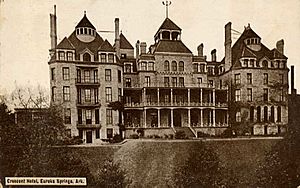
- Blue Spring Heritage Center
- Christ of the Ozarks
- Crescent Hotel
- Eureka Springs & North Arkansas Railway
- Lake Leatherwood Park
- Thorncrown Chapel
Education
Public education
The community is supported by comprehensive public education from the Eureka Springs School District and its facilities:
- Eureka Springs High School (9–12)
- Eureka Springs Middle School (5–8)
- Eureka Springs Elementary School (PK–4)
Private education
Private school education is provided at:
- Clear Spring School (PK–12)
- The Academy of Excellence (PK–8)
Media
Radio and TV
For over-the-air television, Eureka Springs is served by the market based out of Springfield, Missouri. For cable, the Springfield affiliates can be received as well as a couple of stations in Fayetteville/Fort Smith as well as all four Little Rock stations. The local radio station is KESA.
Newspaper
- Carroll County News is published twice weekly, along with regional visitors guides.
- Lovely County Citizen is a tabloid that is distributed free. It publishes the Eureka Springs Visitors Guide.
- ES Independent (established in July 2012) is published in tabloid print format and distributed free.
- Arkansas Democrat-Gazette Northwest Arkansas edition is the only daily newspaper distributed in the area.
Filming location
The film Pass the Ammo was filmed in the city, with the Auditorium featured in several scenes. There are burn marks still visible on the Auditorium from the film's special effects. The movie Chrystal was filmed in Eureka Springs. Parts of the movie Elizabethtown were filmed in Eureka Springs. The 1982 miniseries The Blue and the Gray was filmed around the area. The SciFi Channel's reality series Ghost Hunters investigated the Crescent Hotel during episode 13 of the second season and found that the claims of ghosts in the hotel are true.
Infrastructure
Transportation
Transit
While there is no fixed-route transit service in Eureka Springs, intercity bus service is provided by Jefferson Lines in nearby Berryville.
Roadways
Notable people
Arts and culture
- Elsie Bates-Freund, offered the Summer Art School of the Ozarks in Eureka Springs from 1940 to 1951, and lived in the city for part of the year for the rest of her life
- Candace Camp, schoolteacher in Eureka Springs before becoming a romance novelist
- Irene Castle, silent film actress and ballroom dancer; spent her last years in Eureka Springs
- Frances Currey, folk art painter, spent her final years in a nursing home in Eureka Springs
- Crescent Dragonwagon, co-founded the Writers' Colony at Dairy Hollow; lived in Eureka Springs for a number of years
- Glenn Gant, painter; resided much of his life in Eureka Springs
- Emme Gerhard, photographer; lived in Eureka Springs for a time
- Charles Christian Hammer classical guitarist; spent much of his life in Eureka Springs
- Julius Hegyi served on the faculty of the Inspiration Point Fine Arts Colony as conductor and violinist from 1951 to 1956
- Ben Kynard, jazz saxophonist; born in Eureka Springs
- Byrd Mock, writer and publisher; retired to Eureka Springs in 1956
- Rachel Beasley Ray, poet and author; lived in Eureka Springs for much of her life
- Ned Shank, co-founded the Writers' Colony at Dairy Hollow, lived in Eureka Springs for a number of years
- Marla Shelton, 1930s and 1940s film actress was born in Eureka Springs
- Jonathan Stalling, poet, Chinese literature expert; was raised in Eureka Springs
- Frank Stanford, poet, briefly lived in Eureka Springs
Military
- Marcellus H. Chiles, United States Army Captain, Medal of Honor recipient, was born in Eureka Springs
Education
- Mary Carson Breckinridge, Frontier Nursing Service founder, taught at Crescent College and Conservatory while living in Eureka Springs
Religion
- Baptist minister William Evander Penn made his home in Eureka Springs in "Penn Castle"
- Clergyman and populist political organizer Gerald L. K. Smith retired to Eureka Springs, where he commissioned the Christ of the Ozarks
Sports
- Pat Burrell, Major League Baseball player, was born in Eureka Springs
See also
 In Spanish: Eureka Springs para niños
In Spanish: Eureka Springs para niños


